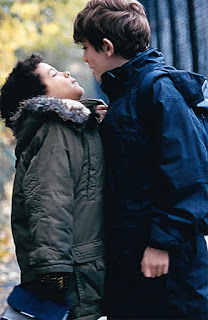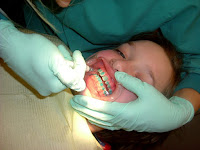No one is ever too old for a temper tantrum.
What is happening, during a meltdown / temper tantrum is largely physiological and almost entirely outside of the person's direct control. In brain science, the term is 'amygdala hijack.'
Basically, the higher (newer, more evolved, more conscious, call them anything you'd like) brain parts are offline: the body/mind has been overwhelmed by something (or an entire backpack of somethings, all piled on top of one another all day, or all month) and now the survival centres are in charge.
Once the survival centres are convinced that dumb monkey brain that rides it has lost the plot, the only options left are attack, runaway, or hide, also known as the fight-flight-flee response.
To be clear: the flight-flight-freeze response is automatic
No one ever elects to freak out, meltdown, or otherwise come completely unglued and out of control. No, really. Not even 'to get their own way.'
This response is biological, and whatever depletes the newer brain parts of options and resources will eventually push anyone into fight-flight-flee. A temper tantrum is 'fight.'
While it is sometimes possible to get a toddler to back down, because fighting is just too dangerous around big, scary adults, often an older child doesn't feel so threatened, so instead of running or freezing, they ... well, the list is long:
- destroy the newly-planted gardens, throwing plant pots, tools and transplants all over the yard
- cut up the flower girl dress they're wearing tomorrow in their aunt's wedding
- throw an armchair through the living room window
- tear everything out of their backpack and smash it, tear it, and throw it around the room . . .et cetera . . .
So... then what?
Not super-helpful to just describe the problem, I know. Here:
First and foremost, let's try to simply avoid them (not always possible, but easier than dealing with them) . . .
- Please become aware of the use of the word 'interrupting' as it applies to children engaged in their activities. It's an uncommon use of the word, because 'what they're doing can't possibly be important.' And that's true, except it's missing the end of the sentence. Before the period, insert 'to you.' It is absolutely important 'to them.' When possible, watch them and wait for a change in their energy and focus (they'll often look around, or fidget more, lean back, stop running around) before suggesting a change of activity
- It takes a hundred million years, and is super-exhausting and difficult to do, but it helps reduce your frustration and their resistance when you get their attention gently and respectfully before engaging them in something you want them to do, or to stop them from what they want to do. Rather than shouting at them (usually repeatedly) walk to where they are, get your face at the same level as their face, touch them gently and say their name quietly. . . wait until they make eye contact, then speak
- Don't ask questions you don't want answers to, like 'do you want to go to bed now' or 'do you want to stop playing that and come and do my chores for me now?' If you won't accept no for an answer, don't phrase it in the form of a question with a yes/no response
- Respect their basic physiological needs. When they're hungry, feed them. When they're thirsty, give them a drink. When they're fidgety, exercise them. When they're tired or overstimulated, rest them. Don't ask questions about this unless you genuinely do not know if they are or are not in need of something, like food. Offer the solution, and don't make a fuss about it. Don't nag them to eat more or less, or sleep more or less. They won't learn to manage their bodies by being bossed around for 20 years and then flung into adulthood, unfamiliar. Depleted bodies have depleted brains, and the more depleted people become, the more likely their amygdala will take charge
There, wasn't that fun and easy? Well, easier than trying to stop a strong and fast young body that's freaking out . . . which brings me to this:
It's Easier to Avoid than Handle, but Sometimes You Get to Handle the Meltdown Anyhow
When you have to, you have to. It may be tempting (and we may have a background of experience from our own childhoods) to shout them down or force them to 'quit it,' but all that does is push the problem further into the future. Future you will not be happier when they're bigger and stronger than you and really snap when you can no longer force them to pretend they're fine.
So, the second list, is what to do instead . . .
- Allow the child to have emotions about what's happening around them and to them, because fighting their body/mind response is a waste of your time, and only makes them feel worse, often amplifying and extending the outburst to epic (see above) proportions. Children are allowed to mind being bossed around, having their choices taken away, and being interrupted. Compliance is not a normal human attribute and they didn't sign the 'be obedient' contract, same as the rest of us; their emotional responses to things are real --and outside their control. Wait, if you can, before saying or doing anything, as more stimulation (words, touch) is often just 'more' for an already overwhelmed body/mind
 Recognize and acknowledge their feelings, since they're real anyhow and there's no way to stop that reality, make it so they don't have to get louder (in words or actions; see, again: above) to feel that they've accurately conveyed the strength of their feelings (eg. 'You sound FURIOUS about having the to get out of the pool because you were enjoying swimming and needed to feel control over your activities.') You will not be able to convince them that they have been heard and understood with inaccurate words like 'don't like' or 'upset' --and don't be afraid to overshoot the intensity. Kids' feelings are adult-size and don't fit into their little bodies; they feel them at very high intensity, not mildly. Oh, one very big P.S. Don't explain, justify, argue or defend what you've just said in the hopes that it will minimize or eradicate their emotions --those make it a whole lot worse, not better
Recognize and acknowledge their feelings, since they're real anyhow and there's no way to stop that reality, make it so they don't have to get louder (in words or actions; see, again: above) to feel that they've accurately conveyed the strength of their feelings (eg. 'You sound FURIOUS about having the to get out of the pool because you were enjoying swimming and needed to feel control over your activities.') You will not be able to convince them that they have been heard and understood with inaccurate words like 'don't like' or 'upset' --and don't be afraid to overshoot the intensity. Kids' feelings are adult-size and don't fit into their little bodies; they feel them at very high intensity, not mildly. Oh, one very big P.S. Don't explain, justify, argue or defend what you've just said in the hopes that it will minimize or eradicate their emotions --those make it a whole lot worse, not better- If it becomes necessary, hold the child so it's impossible for them to hurt themselves or anyone else (when they're bigger and stronger, it can help to keep your back against something firm like a wall, and pin their arms with one arm, their legs with one leg, and their head with the other arm --to avoid headbutting and biting.)
When our little people are overwhelmed by big emotions, it's our job to share our calm, not join their chaos.
~ L.R. Knost, author The Gentle Parent







